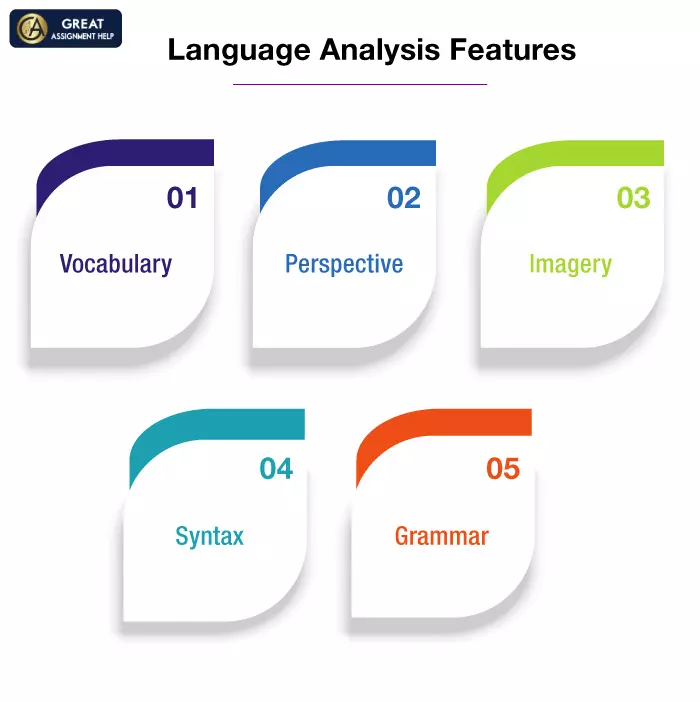Language is an important communication tool effectively used for reading, writing, and speaking thoughts and ideas. But in specific, language holds a major significance in assignment writing, academic writing, article writing, essay writing, etc. Moreover, a language has different aspects and people can use it more impressively based on how well they know it. Most of the time, writing style defines the knowledge of a person. So, it is important to know about language analysis because it helps a person write engaging content and understand complex ideas discussed in a paper. To know more about the definition, features, and elements of language analysis, keep on reading this blog post. Also, from here, learn how to do language analysis.
What is Language Analysis?
A Language Analysis is a complete understanding of what a writer expresses in his/her piece of writing like a poem, an essay, an article, or a story. Writers generally use language features, figures of speech structural techniques, and literary elements to convey their ideas. The process of analyzing the language and the style used by the writers is called Language Analysis.
For instance, if you are asked to complete a language analysis assignment, then, first, you need to carefully study the entire piece of information you are given, and then you have to analyze and identify what techniques the writer has implemented in that. Does it sound difficult? No Worries! You can easily do language analysis if you are aware of the language features. Follow this post to know more.
Key Reasons Why Language Analysis is Important
Language analysis is the technique of analyzing spoken or written language to determine its meaning and application. To know the major reasons why language analysis is important, take a look below
- Improves Writing and Speaking Skills: You can enhance your own writing and speaking abilities by examining language patterns and structures. Also, by recognizing typical mistakes and opportunities for development, you can enhance your communication skills.
- Enhances Critical Thinking and Analytical Abilities: Language analysis calls for rigorous text analysis and critical thinking. Your analytical and critical thinking abilities will improve as a result of this process, which is beneficial in any line of work.
- Helps to Comprehend the Speech or Text Context: Language analysis can help you grasp the context of a document or speech. Furthermore, you can use language structure, vocabulary, grammar, and tone to determine the author’s goal, audience, and overall message.
- Evaluates Written and Spoken Language Quality: For academic and professional reasons, language analysis enables you to evaluate written and spoken language quality. You may also use grading platforms to identify a text’s readability and complexity, which is beneficial when engaging with diverse audiences.
Essential Elements of Language Analysis
If you are given a written piece, then step forward and do a language analysis. As a part of your language analysis, with the piece of text you have, you need to identify the following list of elements in order.
Author:
The person who has written the text is the ‘Author’. When you do language analysis, first make a note of the author’s name because it also creates an impression in the minds of the readers.
Publication:
Check who or which publication has published the text you are going to analyze.
Text type:
Spot what type of writing piece you are about to analyze. Your writing piece can be a story, an essay, a poem, an article, a letter, a speech, or an editorial.
To find out the above-mentioned three elements, you need not read the content. But for the coming elements, you need to read the entire content to make your language analysis process effective.
Audience:
Read and understand to whom the writer or author is addressing. Also, perform an analysis of how the audience will react after reading the text and the effectiveness of the text.
Contention:
It is the main point of view the author is trying to express in the content. In the content identify whether the arguments included by the author are positive or negative.
Title:
Have a look at the title and check whether or not the title is related to the text. Also, note whether it is engaging or persuasive. Readers always have a fascination with award-winning titles.
Persuasive Elements:
Check whether or not the author has incorporated any persuasive techniques or elements in the content. Some writers will use that throughout the write-up while some will include it only in a few sections.
Visual Elements:
To emphasize an idea, a good writer will always use strong visual elements suitable to the write-up. Check whether the text contains any supporting visual elements like images, charts, or graphs.
Tone:
Note in what tone the writer expresses his content. The tone can be formal, informal, or conversational. When presenting the viewpoints, the tone may change, or it will remain the same throughout.
Get to Know the Primary Features of Language Analysis
To do language analysis, you must have a strong knowledge of the language features and the language techniques.
The language features are of different types. In general, language features are classified as structural techniques, language techniques, and literary devices.
The structural techniques focus on the arrangement of ideas in a text. You can’t develop content without language techniques as it is the soul of the language that covers all the words and phrases.
When it comes to writing language analysis assignments, you need to keep an eye on the following language features.
Vocabulary
Analyze and identify what kind of words the writer has used in the text you are given. Also, find why the writer has employed those words in the write-up. By analyzing the vocabulary, you should gain an idea of how the writer or author is playing with words.
To present the content interestingly, the writers generally use symbolism, catchy phrases, adjectives, verbs, etc. However, the poets are very different from the writers because they use figures of speech, rhyming schemes, etc. to add an effect to their write-up.
Perspective
Find out what point of view the writer keeps in his writing. Also, analyze and get to know what the writers are trying to portray and why they are using that point of view. You can present the content in a first, second, or third-person point of view depending on the flow of the text.
Imagery
Analyze the write-up you have and identify what kind of picture or image the writer employs in his/her writing. Some writers use colors to symbolize certain things while some will use attractive landscapes or geographical locations. So, focus on the various imagery techniques the writers have implemented in the write-up to create a visual impact on the reader’s mind.
Syntax
It is one of the tricks the writers usually pick to play with language and create effects in a poem or a novel. The syntax includes sentence structure and punctuation. Moreover, you can use it either in a usual or unusual way.
To enhance the core of the text, some writers use unusual syntaxes like writing long sentences without punctuation, using heavy or short punctuated sentences, and folktale narrative language.
Grammar
Each writer follows his/her style of writing. Some will deliberately write content with grammatical errors. When you analyze a write-up, make sure whether there are any grammar errors and also check whether or not the writer has intentionally made errors. Also, have a look at the rhetorical effects and the tenses used in the write-up.
Common Literary Devices Required To Do Language Analysis
The literary devices are nothing but the literary elements and the literary techniques or figures of speech used by many writers to convey their ideas poetically or more smartly connecting a lot of emotions.
Mentioned here are a few common literary techniques, you can notice in the write-up when you conduct language analysis.
Alliteration
Using the same letter and the same sound at the beginning of pronunciation is called Alliteration. It is a literary device used to create a set of words that start with the sound of the same consonants. The alliteration should not be heavy because it may spoil the flavor of the write-up.
Eg: Betty Bought Better Butter.
Metaphor
It is a word or phrase that describes something in an untrue way. Metaphors are one of the common poetic devices used in poems and literature.
Eg: Love is a battlefield.
Here love is compared to a battlefield, a place where a fight happens.
Onomatopoeia
Onomatopoeia are words that give a vibe of a sound. Some examples of Onomatopoeia sounds include giggle, grunt, sprinkle, drizzle, etc. Just to make the readers feel the action, the writer uses this figure of speech in their sentences.
Eg: He banged the door and left.
Personification
Another important feature you need to look for in a write-up as a part of language analysis is personification. It is a representation of an object or non-living thing as humans. It is a common literary technique that poets and storytellers use.
Eg: My alarm yelled at me in the morning.
Simile
It is a comparison of two different things using ‘like’ or ‘as’. To make a description more vivid, poets extensively use this figure of speech.
Eg: He ran as fast as a Cheetah.
Here the running speed of a man is compared with a fast-running cheetah.
Understand How to Do Language Analysis
For doing a language analysis assignment, you must have a clear idea about the language analysis, different kinds of literary devices, and persuasive writing techniques that were present in the write-up.
Moreover, you can effortlessly write a language analysis report only if you are familiar with all the literary components.
Here are a few steps you need to follow to write an effective language analysis report.
- Firstly, carefully read the material or write-up you have.
- Secondly, in that write-up, mark or underline the important points or phrases used by the author.
- Thirdly, have a closer look at the word choice, language elements, figure of speech, language features, and the writing style used by the author in the write-up.
- Next, based on your language analysis, compose a well-structured paper by including essential sections such as the introduction, thesis statement, body paragraphs, and conclusion.
- Lastly, after you have finished writing your language analysis thesis, proofread the content thoroughly. The final draft that is ready for submission should be flawless, original, and informative.
Final Words
An excellent language analysis report will say a lot about your writing style and language knowledge. Moreover, it will also stand as proof of your splendid language analysis skills. So, when you are asked to submit a language analysis assignment, remember to follow all the key strategies mentioned in this blog. Most importantly, sticking to the tips and techniques mentioned here will also help you become a master of language analysis. In case, it is troublesome for you to create a language analysis report, get in touch with us. We have several language experts as assignment helpers in our team to assist you in completing your language analysis task in the way you want and achieving top grades in your class.




